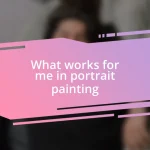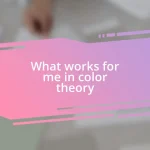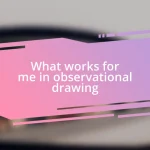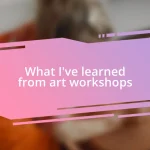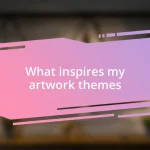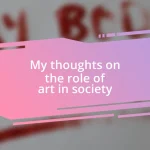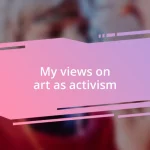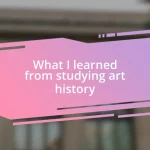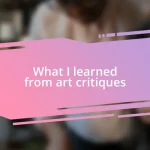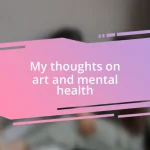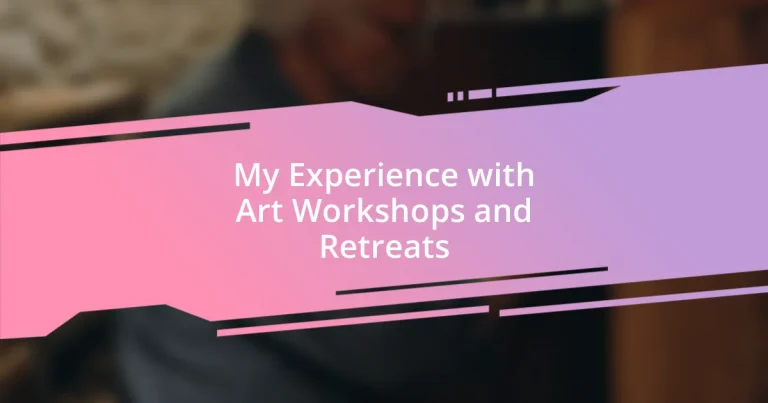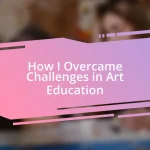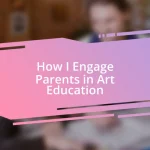Key takeaways:
- Art workshops foster creativity and emotional release, transforming participants through shared experiences and supportive environments.
- Art retreats provide a deeper immersive experience, allowing for self-discovery in tranquil settings that inspire artistic expression.
- Maximizing the art workshop experience involves stepping out of comfort zones, embracing downtime for creativity, and actively seeking feedback.
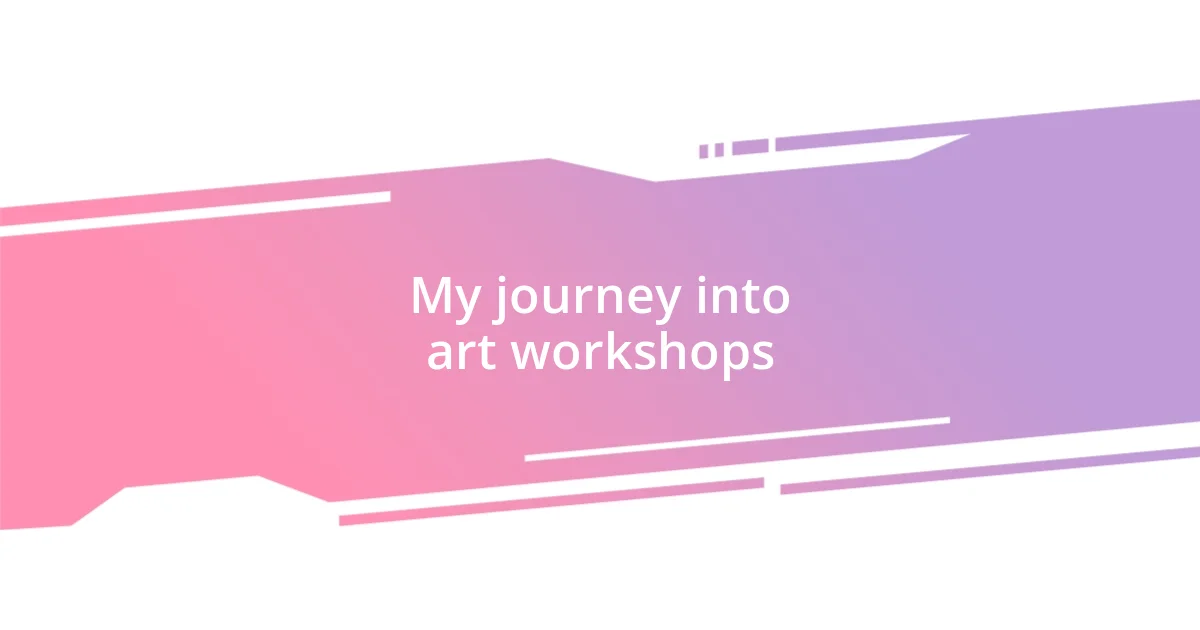
My journey into art workshops
When I first stumbled upon my first art workshop, I remember the flutter of excitement mixed with a hint of trepidation. Would I really fit in? The moment I stepped into that vibrant studio filled with brushes, paint splatters, and laughter, I felt an immediate sense of belonging that I hadn’t anticipated. It was a revelation—safe and warm, as if the walls themselves were welcoming me into this new world.
As the days unfolded, I found myself immersed in a sea of creativity, surrounded by fellow artists, each bringing their unique perspectives and experiences. I still recall a particular afternoon when we were asked to paint with our non-dominant hand. The laughter was contagious; it felt like we were children again, and I discovered a playful side to my creativity I hadn’t explored before. Isn’t it interesting how breaking the rules can lead to some of our most authentic expressions?
Over time, the workshops became something more than just a place to create; they turned into a sanctuary for self-discovery and emotional release. I can vividly remember a silent moment while I painted one day, tears spilling onto the canvas as colors blended like an emotional storm. Hasn’t everyone experienced a release through art at some point? It was in those moments that I understood the profound connection between art and emotion—workshops had not only helped me grow as an artist but also as an individual.

Understanding art retreats concept
Art retreats present a fascinating concept that intertwines creativity with introspective exploration. They’re often set in serene locations, allowing artists to step away from the hustle and bustle of everyday life. During my time at a retreat nestled in the mountains, I found clarity in the calmness; the stunning natural surroundings became a muse that inspired my work. Isn’t it amazing how a change in environment can ignite fresh ideas and perspectives?
Unlike regular workshops, art retreats typically offer an extended period of immersion, where time feels like it stands still. I remember spending an entire weekend at one retreat, waking up early to paint as the sun rose, the stillness around me allowing deep connections with my art and self. Such deep engagements create a unique atmosphere where true creativity can flourish—where every brushstroke feels deliberate and meaningful, echoing with newfound insights.
Moreover, the communal aspect of art retreats fosters a powerful sense of camaraderie among participants. I recall moments of shared laughter and vulnerability as we critiqued each other’s works, building a safe space where everyone felt encouraged to explore personal themes. It’s this blend of individual expression and collective support that makes retreat experiences so enriching, shaping not just our art but our souls.
| Aspect | Art Retreats |
|---|---|
| Duration | Typically longer, often several days |
| Environment | Set in tranquil, inspiring locations |
| Focus | Deep creative exploration and self-discovery |
| Community | Strong emphasis on support and shared experiences |
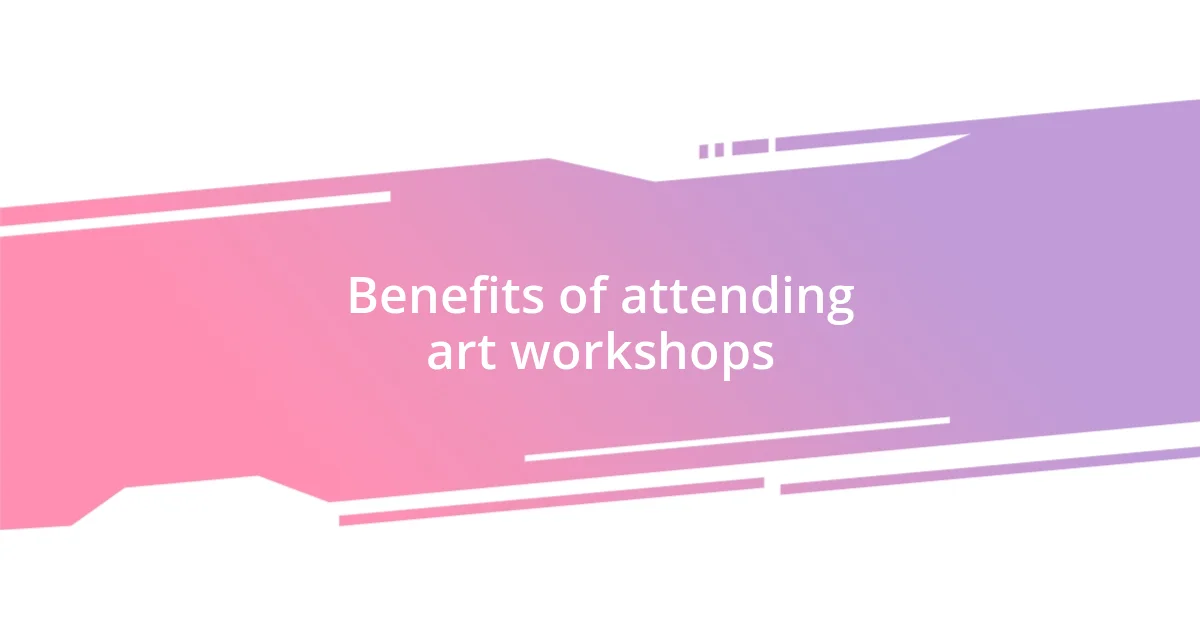
Benefits of attending art workshops
Participating in art workshops offers a plethora of benefits that extend beyond just honing artistic skills. I remember when I first tried my hand at printmaking in a workshop; I felt an exhilarating sense of discovery as I learned new techniques. Each session was like unwrapping a gift, revealing new layers of creativity. The boost in confidence from sharing my art with others was palpable. It’s incredible how stepping out of one’s comfort zone can spark not just creativity but also personal growth.
Here are some specific benefits of attending art workshops:
- Skill Development: You gain hands-on experience with different mediums and techniques.
- Creative Exploration: Workshops encourage you to experiment in ways you might not at home.
- Community Connection: The camaraderie of fellow artists fosters a supportive environment.
- Emotional Release: Creating art provides a healthy outlet for emotions and stress relief.
- Feedback Opportunities: Valuable critiques from peers and instructors help refine your work.
From my experience, attending workshops isn’t just about making art; it’s about forging connections with others who share your passions. There were moments when I found myself captivated by the stories of fellow participants and their unique journeys. One time, a workshop ended with participants sharing our artworks and stories behind them. The vulnerability shared in that circle was powerful; it felt like our art had created a bridge between us, illuminating our shared humanity. There’s something truly magical about that sense of belonging, don’t you think?
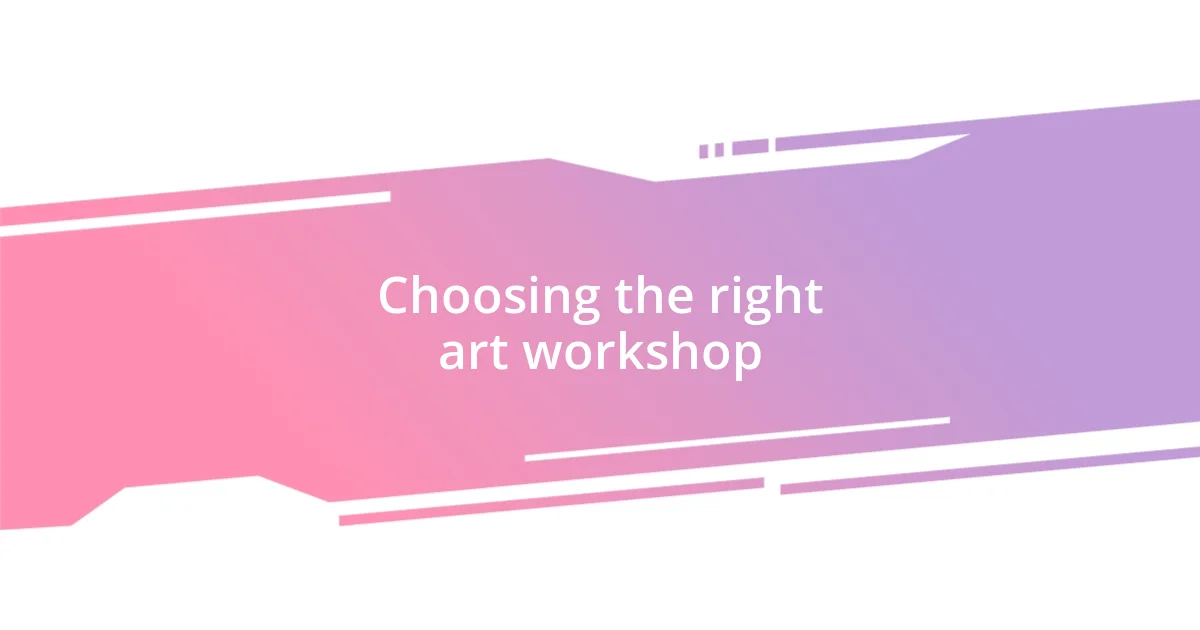
Choosing the right art workshop
Choosing the right art workshop can feel daunting, yet it’s an essential step toward enhancing your artistic journey. Reflecting on my own experiences, I’ve found it fundamental to consider what you want to achieve. For instance, when I signed up for a landscape painting workshop, my goal was to immerse myself in nature’s beauty and learn to capture it on canvas. That clear focus helped me narrow down my options and ultimately made the experience more fulfilling.
Another aspect to contemplate is the instructor’s style and expertise. I remember attending a mixed-media workshop led by an artist whose work resonated deeply with my own aesthetic. Their guidance was invaluable, as they encouraged us to push boundaries and try unorthodox methods. This dynamic not only bolstered my confidence but transformed my understanding of creative expression. So, ask yourself, does the instructor’s approach align with your artistic vision?
Finally, consider the workshop’s environment and group dynamics. At one point, I was part of a small, collaborative group where everyone’s input fostered a vibrant atmosphere. It was thrilling to watch how different perspectives elevated our art, infusing it with a richness that I hadn’t anticipated. I genuinely believe that the right community can inspire you to reach new heights; who knows how much your art could evolve with the right support around you?
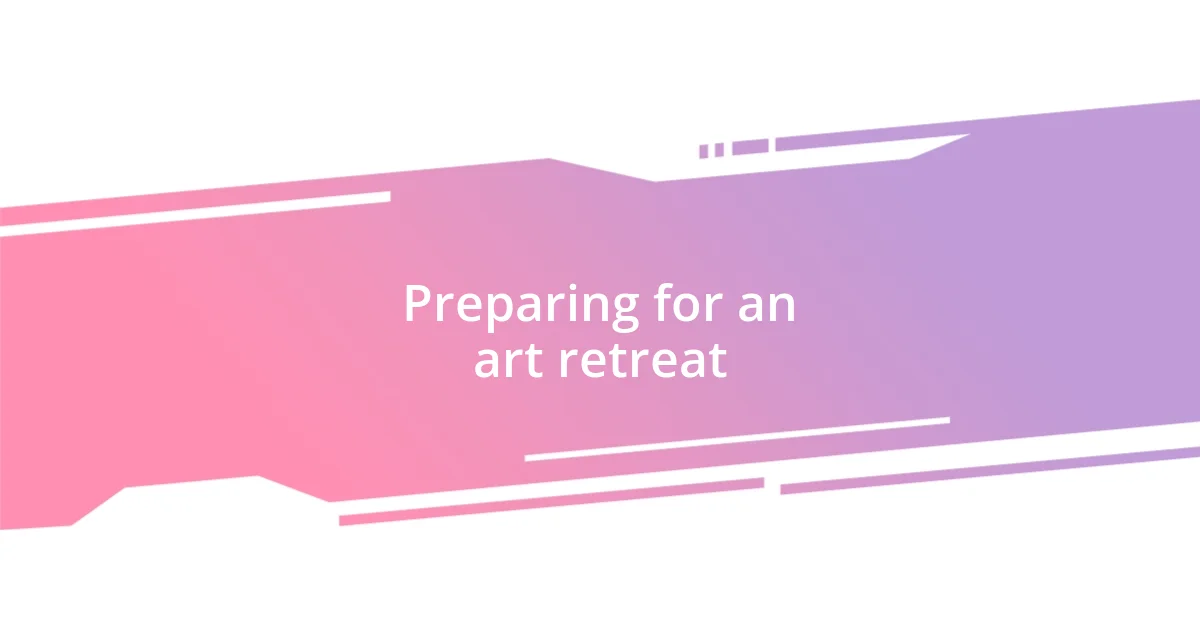
Preparing for an art retreat
Preparing for an art retreat involves a bit more than just packing supplies; it’s about setting the right mindset for creativity. I vividly recall the days leading up to my first retreat. I cleared my calendar, letting go of distractions, which created a palpable sense of excitement. It was like preparing for an adventure I had long dreamed of. Have you ever felt that mix of anticipation and anxiety? I did, but I learned that embracing those emotions is part of the journey.
I found that creating a checklist of essential items was a game changer. Beyond my sketchbook and paints, I included personal items that fostered comfort, like my favorite mug and a cozy blanket. Bringing these familiar objects felt like a warm hug as I settled into the new environment. Plus, I always brought along a journal—not just for notes but as a space to document my thoughts and feelings. Isn’t it fascinating how these little things can help ground you amidst a whirlwind of new experiences?
Lastly, connecting with fellow participants before the retreat can enrich your experience immensely. I remember reaching out to someone through a workshop’s Facebook group, and we discovered we shared similar artistic goals. That initial conversation made seeing a familiar face at the retreat so much more comforting, and we ended up collaborating on a project that I still cherish. Have you considered the power of these early connections? They can cultivate a sense of belonging even before the actual retreat begins, making the experience feel even more profound.
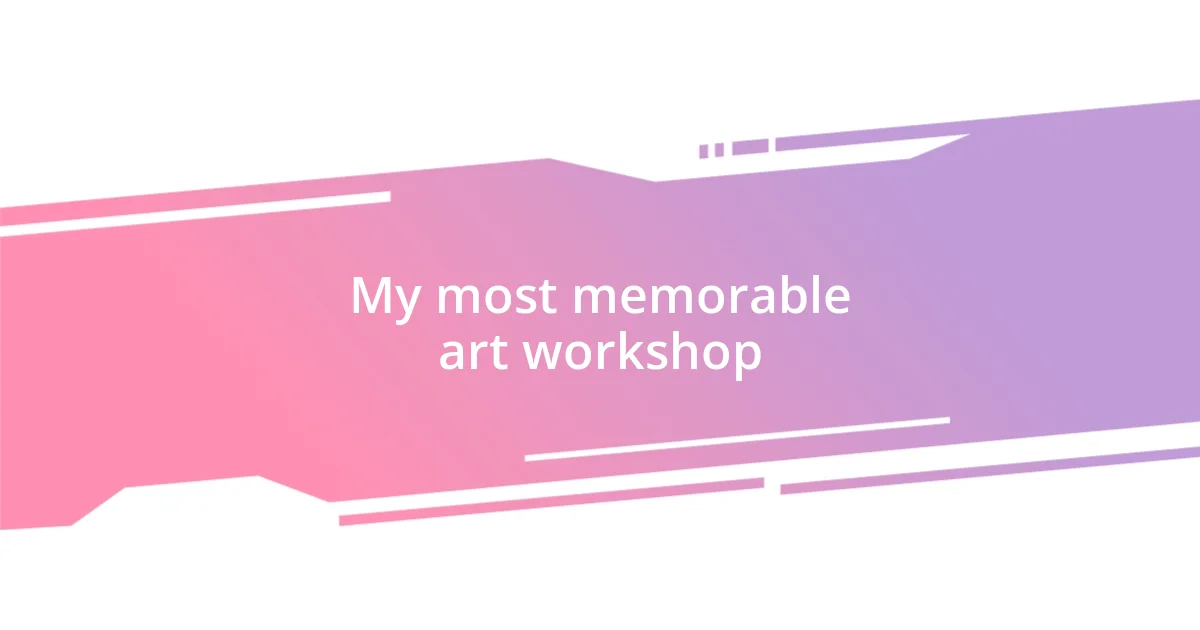
My most memorable art workshop
Attending my most memorable art workshop was a transformative experience that stays with me to this day. It was a week-long retreat in a picturesque coastal town, and I remember arriving full of both excitement and anxiety. With my paintbrush and a sense of wonder in hand, I was ready to explore new horizons in my artistic journey. Have you ever felt that exhilarating mix of eagerness and nerves when stepping into the unknown? I certainly did, but it was within that uncertainty that I discovered immense growth.
One particular moment stands out: we were all set to paint a sunrise on the beach, guided by an exceptionally passionate instructor. As the golden hues spread across the sky, I felt a fierce urge to capture its beauty perfectly. However, as I painted, I realized that my fear of imperfection was holding me back. I took a deep breath and allowed myself to paint freely. Watching my peers immerse themselves in their interpretations inspired me to let go, blending spontaneity with technique. That moment taught me that art is not solely about accuracy; it’s about feeling and expressing the world around us.
Throughout the workshop, I forged connections with fellow artists who were just as eager to share stories and techniques. One evening, we gathered around a bonfire, exchanging thoughts about our creative processes. I remember laughing and feeling a sense of belonging that I hadn’t anticipated. Isn’t it amazing how art can bring people together, creating bonds that transcend age and experience? That week felt like a celebration of creativity and camaraderie, leaving me with cherished memories and a renewed passion for my art.
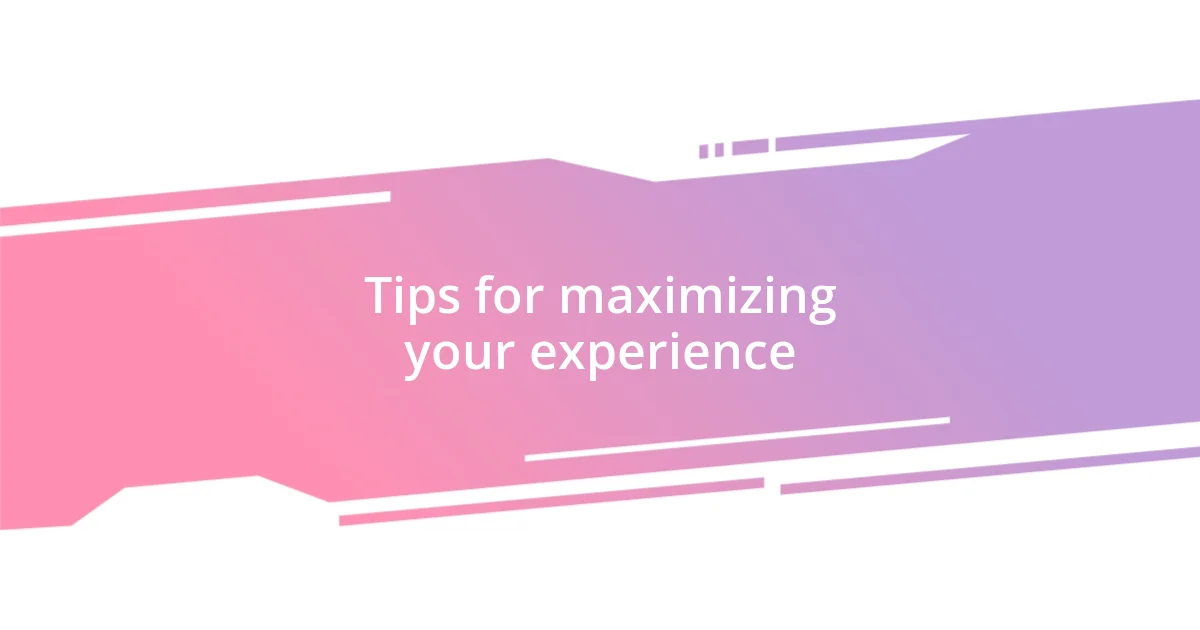
Tips for maximizing your experience
To truly maximize your experience at art workshops and retreats, I suggest stepping out of your comfort zone. During one retreat, I hesitated to experiment with new techniques because I felt tied to my familiar style. But once I moved past that fear, I created pieces that surprised even me. Have you ever taken a leap into the unknown and found something incredible waiting on the other side? It’s in those moments of exploration that real growth happens.
Another tip is to embrace downtime as a creative opportunity. I remember running into a fellow participant who was sketching by the lake during our free time. This inspired me to take nature walks with my sketchbook, allowing spontaneity to fuel my creativity. That change of pace not only rejuvenated my spirit but also resulted in some of my favorite sketches. Isn’t it fascinating how the environment can nurture your artistic journey if you let it?
Lastly, don’t shy away from asking questions and seeking feedback. In one workshop, I felt nervous to share my work, but when I finally did, the constructive criticism offered was invaluable. I learned so much about my style and how to push beyond my perceived limits. How often do we let fear silence our voices? By speaking up, you invite growth and connection, transforming your retreat into a truly enriching experience.
